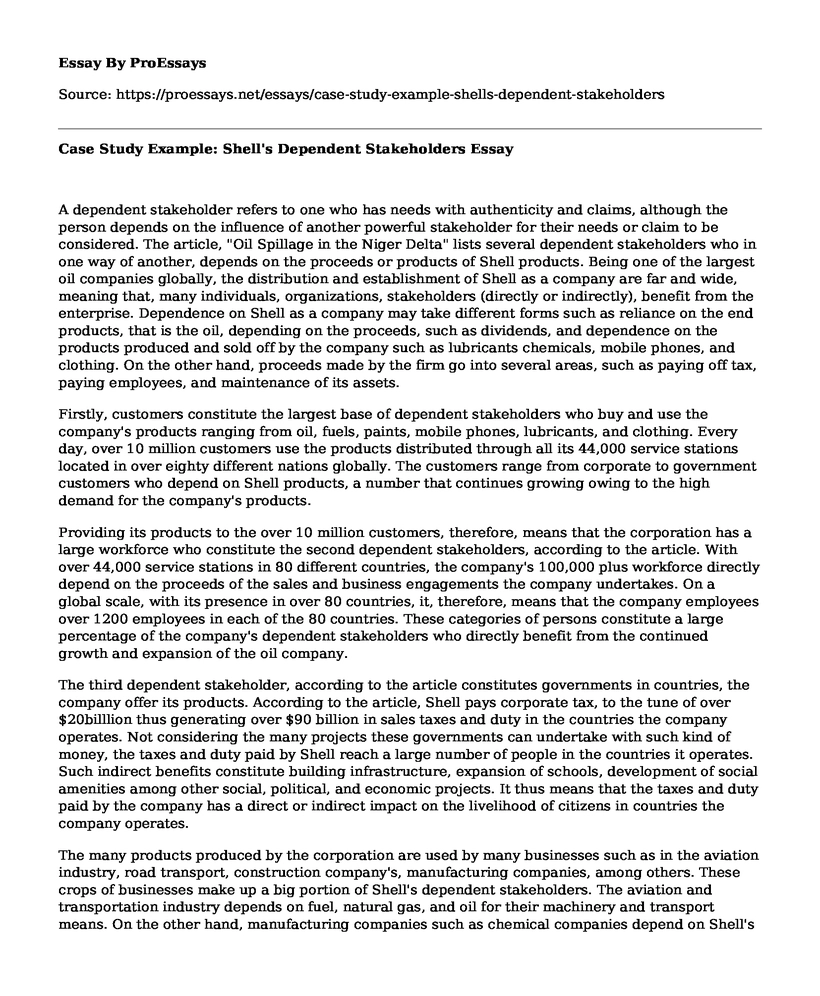A dependent stakeholder refers to one who has needs with authenticity and claims, although the person depends on the influence of another powerful stakeholder for their needs or claim to be considered. The article, "Oil Spillage in the Niger Delta" lists several dependent stakeholders who in one way of another, depends on the proceeds or products of Shell products. Being one of the largest oil companies globally, the distribution and establishment of Shell as a company are far and wide, meaning that, many individuals, organizations, stakeholders (directly or indirectly), benefit from the enterprise. Dependence on Shell as a company may take different forms such as reliance on the end products, that is the oil, depending on the proceeds, such as dividends, and dependence on the products produced and sold off by the company such as lubricants chemicals, mobile phones, and clothing. On the other hand, proceeds made by the firm go into several areas, such as paying off tax, paying employees, and maintenance of its assets.
Firstly, customers constitute the largest base of dependent stakeholders who buy and use the company's products ranging from oil, fuels, paints, mobile phones, lubricants, and clothing. Every day, over 10 million customers use the products distributed through all its 44,000 service stations located in over eighty different nations globally. The customers range from corporate to government customers who depend on Shell products, a number that continues growing owing to the high demand for the company's products.
Providing its products to the over 10 million customers, therefore, means that the corporation has a large workforce who constitute the second dependent stakeholders, according to the article. With over 44,000 service stations in 80 different countries, the company's 100,000 plus workforce directly depend on the proceeds of the sales and business engagements the company undertakes. On a global scale, with its presence in over 80 countries, it, therefore, means that the company employees over 1200 employees in each of the 80 countries. These categories of persons constitute a large percentage of the company's dependent stakeholders who directly benefit from the continued growth and expansion of the oil company.
The third dependent stakeholder, according to the article constitutes governments in countries, the company offer its products. According to the article, Shell pays corporate tax, to the tune of over $20billlion thus generating over $90 billion in sales taxes and duty in the countries the company operates. Not considering the many projects these governments can undertake with such kind of money, the taxes and duty paid by Shell reach a large number of people in the countries it operates. Such indirect benefits constitute building infrastructure, expansion of schools, development of social amenities among other social, political, and economic projects. It thus means that the taxes and duty paid by the company has a direct or indirect impact on the livelihood of citizens in countries the company operates.
The many products produced by the corporation are used by many businesses such as in the aviation industry, road transport, construction company's, manufacturing companies, among others. These crops of businesses make up a big portion of Shell's dependent stakeholders. The aviation and transportation industry depends on fuel, natural gas, and oil for their machinery and transport means. On the other hand, manufacturing companies such as chemical companies depend on Shell's chemicals for the manufacture of various products such as detergents, paints, and waterproof clothing. Due to the high demand for paints and chemical products, companies in the production of these products directly depend on Shell's chemicals to produce their end products such as paints for their markets. For example, lubricants have numerous uses and application, making it one of the most sought out bi-products by most companies. On the other hand, the manufacture of domestic products such as detergents requires chemicals only offered by Shell. The construction of roads requires significant amounts of bitumen, on the other hand, local heating needs gas only supplied by Shell in the countries it operates in. All the above company's constitute a significant percentage of dependant-stakeholders who look up to Shell's products in the market.
Conclusion
In one way or another, Shell as a company has many dependent stakeholders who rely on the enterprise's products and proceeds either directly or indirectly, from the company directly or from the country the company operates. It thus means that a large number of dependent stakeholders benefit a lot from the operation and trade of the company in the various countries it has invested in which may be directly or indirectly. Although the report does not give all the precise beneficiaries and stakeholders in the business chain of Shell as a company, those who derive benefits from the company are many despite the means and ways in which the benefits reach them. However, the success story of the company, explains a large number of dependent stakeholders of the enterprise.
Cite this page
Case Study Example: Shell's Dependent Stakeholders. (2021, Apr 21). Retrieved from https://proessays.net/essays/case-study-example-shells-dependent-stakeholders
If you are the original author of this essay and no longer wish to have it published on the ProEssays website, please click below to request its removal:
- Nurses as Leaders in Healthcare Reform. Essay Example
- Essay Sample on Entrepreneurship: The Sewing Business
- Essay Sample on Good Leadership: Key to Enhancing Organizational Performance
- Research Paper on Managerial Economics: Analyzing Apple Co. for Sound Business Decisions
- Successful Leaders: Developing Leadership Styles for Success - Essay Sample
- Firestone: MNC Survival in Unprecedented Times - Essay Sample
- Essay Sample on Stephen Covey: 5 Principles of Leadership Every Leader Should Follow







